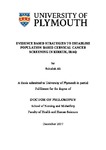EVIDENCE BASED STRATEGIES TO ESTABLISH POPULATION-BASED CERVICAL CANCER SCREENING IN KIRKUK, IRAQ
| dc.contributor.supervisor | Donaldson, Craig | |
| dc.contributor.author | Ali, Suhailah | |
| dc.contributor.other | Faculty of Health | en_US |
| dc.date.accessioned | 2018-07-24T08:56:37Z | |
| dc.date.available | 2018-07-24T08:56:37Z | |
| dc.date.issued | 2018 | |
| dc.identifier | 10457813 | en_US |
| dc.identifier.uri | http://hdl.handle.net/10026.1/11872 | |
| dc.description.abstract |
Background: Cervical cancer may be fatal to women if not identified and treated early. In Iraq, cervical cancer ranks as the 10th most frequent cancer among women between 15-44 years of age, with about 291 new cervical cancer cases diagnosed annually. Cervical cancer can be prevented in two ways: primary prevention aimed at preventing HPV infection through prophylactic HPV vaccinations; and secondary prevention aimed at preventing precancerous lesions from progressing into invasive lesions through screening. Cervical cancer screening is under researched in Iraq. It is clear that Iraq’s years of isolation and disorder has resulted in a loss of research capacity. Aim: To provide evidence–based strategies to establish population based cervical cancer screening services in Iraq. Methods: A mixed methods sequential exploratory design was used; an iterative mixed method approach which included the triangulation of qualitative, quantitative and systematic review methods. Results of all phases were used to develop an emergent theory around the barriers for establishing cervical screening programme and to provide evidence to enhance cervical cancer screening services to be established in Iraq. Findings: The findings from the systematic review indicated significant health inequalities for Arab Muslim women, in that no population-based cervical cancer screening programmes have been implemented in most of Western Asian and Middle Eastern Arab countries. Findings from the qualitative phase revealed gap in theoretical and practical knowledge among the health care professionals regarding cervical cancer screening programmes with a lack of the capacity and infrastructure to establish population based cervical screening programme in Kirkuk, Iraq. Also, results suggest that the health behaviour of women living in Kirkuk is influenced by cultural ‘stigma’ around the word ‘cancer’, in addition to women’s lack of awareness in relation to smear test and cervical screening. Conclusion: Women in Iraq are more likely to be diagnosed at an advanced, rather than early stage of cervical cancer. These women should be targeted by cervical cancer screening and health education programmes. Policy makers need to improve the cervical screening infrastructure and make the cervical screening service more accessible to women. The current opportunistic cervical screening services are insufficient; there is an urgent need to developing cervical cancer intervention programmes. | en_US |
| dc.description.sponsorship | Iraqi Ministry of Higher Education | en_US |
| dc.language.iso | en | |
| dc.publisher | University of Plymouth | |
| dc.subject | Cervical cancer | |
| dc.subject | Screening | |
| dc.subject | Smear test | |
| dc.subject | Health system | |
| dc.subject | Gynecologists | |
| dc.subject | Practical challenges | |
| dc.subject | Iraq | en_US |
| dc.subject.classification | PhD | en_US |
| dc.title | EVIDENCE BASED STRATEGIES TO ESTABLISH POPULATION-BASED CERVICAL CANCER SCREENING IN KIRKUK, IRAQ | en_US |
| dc.type | Thesis | |
| plymouth.version | publishable | en_US |
| dc.identifier.doi | http://dx.doi.org/10.24382/945 | |
| dc.rights.embargoperiod | No embargo | en_US |
| dc.type.qualification | Doctorate | en_US |
| rioxxterms.version | NA | |
| plymouth.orcid.id | 0000-0002-6403-8863 | en_US |
Files in this item
This item appears in the following Collection(s)
-
01 Research Theses Main Collection
Research Theses Main


